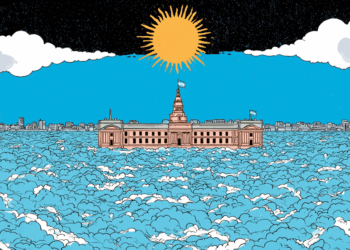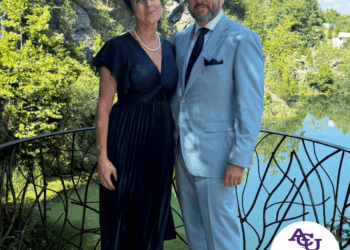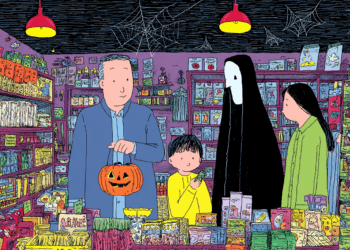When I think of war — and the pain, cruelty, and hypocrisy it brings — I feel ashamed before little children. What have we, the adults, prepared for them? What kind of world will they enter? Can this be remedied, or are our mistakes irreversible?
It is no secret that Ukraine is going through a demographic crisis — one that is more accurately called a catastrophe, given the loss of millions upon millions of people. A country at war is hardly a place to live and raise children. Air raid sirens and explosions are a poor accompaniment to love.
In September 2024, a CIA report stated that Ukraine had the highest mortality rate and the lowest birth rate in the world. Since then, the situation has only worsened.
I do not need statistics to grasp the scale of the tragedy. I see it with my own eyes. At the school where my youngest granddaughter started first grade this September, there are nearly a third fewer first-graders than last year. Her teacher told me so. If this is not the edge of the abyss, then what is? The fall itself?
My elder granddaughter, like millions of other Ukrainian children, lives and learns in the European Union. During our video calls, I hide my pain behind a smile.
In 2022, when Russian troops were advancing on Kyiv, she was a nine-year-old girl sitting on my lap in the back seat of an overcrowded car rushing toward the western border. Now she is twelve. We have lost our bond — our little secrets, our jokes, our lively conversations. Nothing can fill that gap of four years and three thousand kilometers.
We end our conversations with hopes that we will see each other soon, but we both know those are empty words. The war goes on. Air travel is suspended. Ukrainian schools are considered as fitting a target for Russian missiles as any other.
Recently, I met my seven-year-old granddaughter after school, and she told me that she and the other children had spent the day in a bomb shelter. I asked her what they did there.
“We just ran around the corridor,” she replied. “It was boring.”
When an air raid siren catches her at home, her mother puts on cartoons and covers her ears with headphones so she won’t hear the explosions. At her age, she still doesn’t wake up when she is carried at night from her bed to a mattress in the hallway, away from the window. But she is growing up, and soon she will begin to ask difficult questions.
Why has the war gone on for so long? How did it begin at all? What keeps us from winning if we are in the right and so many determined allies stand with us? When will peace finally come? When will her father be allowed to take her to the sea?
Such simple, such difficult questions. When will Ukraine’s defenders be reunited with their families and able to lift into their arms their children — those already born and those yet unborn. What bedtime stories will they tell them? How many of us Ukrainians will remain in the country if the borders open, offering a choice between the road back and the road west?
Women no longer want to give birth. They are afraid
When I walk, I see pregnant women and babies in strollers less and less. These are not numbers in statistical reports. This is reality. Women no longer want to give birth. They are afraid. They do not feel protected.
If Russian forces one day break through the front and advance, their husbands will not be able to accompany them across the border. If Ukraine’s air defenses shoot down an enemy drone near their home, their babies could be harmed. Children are so small, so priceless, so vulnerable. It takes immense courage to bring them into this anxious world, with its future shrouded in the smoke of war.
A married couple I know still chose to take that step. They are tall, striking, and young. In another time, they might have had two or three children. Not now.
The mother is happy, but in her eyes one can glimpse a silent anxiety. The man, in his early forties and thus liable for military service, often looks more worried than serene. It is unconscious. This is the natural expression of most Ukrainians now, even when they laugh.
I saw their tiny daughter a couple of weeks after she was born. They named her Sofia. She was sleeping in a stroller, wearing a funny little bonnet, her eyes darting beneath her eyelids, her tiny fingers clenching and unclenching on their own. In her short life, she has already been in a bomb shelter twice.
I did not speak to her parents about the risks — they knew them without me. I simply told them that their little girl was wonderful and that her name was beautiful.
“We chose a European one,” her father explained. “So it wouldn’t sound strange if she has to live in the West.”
He didn’t say “us.” He said “her.”
We have no fewer than five million children growing up without fathers
Considering the millions of refugees, the millions living under occupation, and the million defenders of Ukraine, we have no fewer than five million children growing up without fathers. Many of them will never see theirs again.
Sofia is fortunate. I want to believe that she will have someone to call Dad when she grows up. I hope that all Ukrainian children will. I know this is not so, and I push that knowledge into the far corner of my mind.
It is like a pain you hide from others. And it is a feeling of guilt for all of us — adults, rational, responsible, experienced people — who have built a world in which our children’s future is so fragile.












